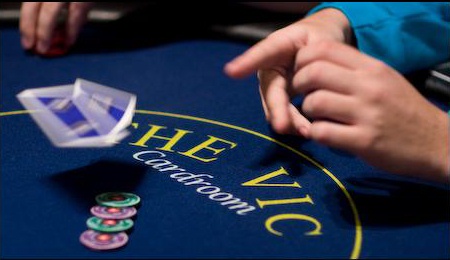|
|

Lay Down - To fold, usually used at times when facing a bet.
When a player throws their hand away, they often do so by laying their hand face down on the table, and pushing it towards the dealer.
For this reason, the act of throwing your hand away has become known as “making a laydown.” It is often used in the context of a
difficult or consequential folding opportunity.
Often, when you are facing a tough bet or raise, the pot is laying you substantial odds to make the call. The question often is,
whether or not those odds are substantial enough to make up for the statistical disadvantage that you may be at. Many amateurs err on
the side of calling too much, because the pot looks large and attractive, and because they feel that they have a chance to win it if
they are lucky. Players who take this approach are known as
calling stations, and they frequently call
when they do not legitimately have pot odds. More advanced players understand that this type of player is often not capable of making
a tough lay down. This is because the amateur player is neither disciplined enough nor sophisticated enough to pick up on or interpret
the subtle clues available to him which indicate whether or not his hand is any good. The amateur is largely oblivious to all of that.
Instead, if he feels he has a chance, he calls.
More advanced players are able to better evaluate where they stand against a tough bet or raise. They understand that they only want
to call if they have pot odds or implied odds to do so. They further understand that within their opponents betting styles and
patterns, is locked information about whether pot odds do, in fact, exist. Much of the time, they will not. The advanced player knows
his job is to decipher when pot odds do exist, because this will determine whether he should make a tough call or a good laydown.
Clearly, a difference in the ability to accurately assess
value is one of the things that separate amateur
players from advanced players. The best players are able to react with the correct play based on scant information. It is almost as if
they “sense” what the best play is.
It is no surprise that poker players appreciate and respect a good poker play when they see one. For this reason, poker plays are
often judged by their effectiveness, and by how tough they were to make. If a player wins a pot because they made a tough call or a
difficult raise, they may be complimented with a “Nice call,” or a “Great raise.” Alternatively, if a player makes a call when he
clearly should not, it may be regarded as a “Terrible call.”
Laydowns, like their counterparts, bets and raises, can also be considered as either great or terrible. A great laydown is one that is
very difficult to make, but correct. Players who play pot limit and no limit poker are often faced with the prospect of having to make
a great laydown in order to survive. Typically, players who troll for bits of information, and those who are capable of complex
strategic thought, are also the ones who are also capable making great laydowns. Great plays are made on the margins, and this
requires a certain level of sophistication.
Players will sometimes throw their hand away when the situation clearly indicates that they should call. This is referred to as a “bad
laydown.” Bad laydowns often result from a careless or incorrect reading of the situation a player faces. Certain players are more
susceptible to making bad laydowns than others. Players who play very tight and conservatively often make bad laydowns on big pots.
Their conservative style of play is not conducive to looking for profit on long shot draws. Often, they will not even consider these
draws, regardless of how big the pot is or whether or not they have the pot odds to call. Bad laydowns are typically made by
tight players who are playing too tight.
From time to time, everyone will lay down the best hand. This is part of the game. Through excellent play, you can minimize the chance
that you will lay the best hand down, but you cannot eliminate that risk altogether. How you react when it happens is important. Some
players vow to never let it happen to them again, and become calling stations. This strategy will cost you far more over the long run
than it returns. If you laid the hand down in error, you should try to learn from your mistake, whereas, if your lay down was sound,
you should just accept it as part of the game.
Usage: Lay It Down, Easy Laydown, Lay Down Your Hand
Previous Poker Term: Kill Pot
Next Poker Term: Lead |
|









